9th Conference on River Basin Management Including all aspects of Hydrology, Ecology, Environmental Management, Flood Plains and Wetlands
19 - 21 July, 2017
Prague, Czech Republic
Introduction
River Basin Management 2017 is the 9th Conference in the series which marks the growing international interest in the planning, design and management of river basin systems.
River Basin Management includes all aspects of Hydrology, Ecology, Environmental Management, Flood Plains and Wetlands. Riverine systems are coming under increasing pressure due to anthropological and natural causes. Prominent amongst the problems affecting them is water scarcity and quality, which requires the development of improved methods for better river management.
Changes in the landscape, use of the land and climate conditions lead to a continuous revaluation of river basin management objectives. This requires the development of better measuring tools as well as the use of increasingly accurate computer software.
Catastrophic events such as floods and associated landslides, erosion and sedimentation can have serious effects not only on life and property but also on the basin ecology. Frequently these problems are aggravated by the unforeseen consequences of man made changes in the river basin. This has led in recent years to work on river restoration and rehabilitation with various degrees of success.
The first River Basin Management conference took place in Cardiff, UK in 2001, followed by meetings in Las Palmas, Gran Canaria (2003); Bologna, Italy (2005); Kos, Greece (2007); Malta (2009); Riverside, California (2011); The New Forest, UK (2013), home of the Wessex Institute and A Coruna, Spain (2015).
The objective of this series of conferences is to bring together practitioners and researchers in academia and industry in the hope that their interaction will foster mutual understanding and lead to better solutions for river basins.
The papers corresponding to all the conferences have been archived in digital form at http://www.witpress.com/elibrary where they are permanently available to the international community.
River Basin Management includes all aspects of Hydrology, Ecology, Environmental Management, Flood Plains and Wetlands. Riverine systems are coming under increasing pressure due to anthropological and natural causes. Prominent amongst the problems affecting them is water scarcity and quality, which requires the development of improved methods for better river management.
Changes in the landscape, use of the land and climate conditions lead to a continuous revaluation of river basin management objectives. This requires the development of better measuring tools as well as the use of increasingly accurate computer software.
Catastrophic events such as floods and associated landslides, erosion and sedimentation can have serious effects not only on life and property but also on the basin ecology. Frequently these problems are aggravated by the unforeseen consequences of man made changes in the river basin. This has led in recent years to work on river restoration and rehabilitation with various degrees of success.
The first River Basin Management conference took place in Cardiff, UK in 2001, followed by meetings in Las Palmas, Gran Canaria (2003); Bologna, Italy (2005); Kos, Greece (2007); Malta (2009); Riverside, California (2011); The New Forest, UK (2013), home of the Wessex Institute and A Coruna, Spain (2015).
The objective of this series of conferences is to bring together practitioners and researchers in academia and industry in the hope that their interaction will foster mutual understanding and lead to better solutions for river basins.
The papers corresponding to all the conferences have been archived in digital form at http://www.witpress.com/elibrary where they are permanently available to the international community.
Conference Topics
The following list covers some of the topics to be presented at River Basin Management 2017. Papers on other subjects related to the objectives of the conference are also welcome.
- Water resources management
- Flood risk management
- Ecological and environmental impact
- Erosion and sediment transport
- Hydrological modelling
- River restoration and rehabilitation
- Hydropower issues and development
- River and watershed management
- Water quality issues
- Organic contamination management
- Agricultural pollution
- Transboundary water issues
- Estuaries and deltas
- Climate change
- Water quality and health
- Socio-economic issues
- Water governance and policies
- Data acquisition, management and analysis
- Remote sensing
- Hydraulic structures
- Experimental measurements
- Rain water management
- Water energy nexus
- Drought assessment and management
- Ecosystem services
Find out more on the conference webpage.
